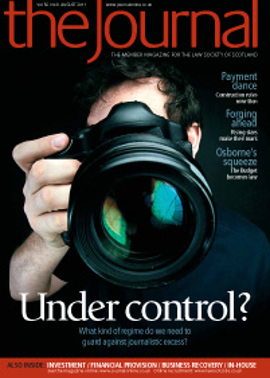Recipe for fudge
Once it was simple. If you happened to be male, you paid. Not necessarily fair, but at least everyone understood where they stood, and people just got on with it… more or less. It was argued that expenses in family causes were determined by reference to the praepositura rebus domesticis, as part of a wife’s necessities. And if you happened to be a male paramour, that was seriously bad luck.
This archaic rule was eventually scrapped by s 7 of the Law Reform (Husband and Wife) (Scotland) Act 1984, but the praepositura did not fully disappear until s 22 of the Family Law (Scotland) Act 1985. There is otherwise apparently no statutory provision or rule of court which sets out how to deal with expenses in family cases, and in my view this absence often leads to unfairness. The praepositura was swept away, but nothing concrete replaced it.
Little v Little 1990 SLT 785 probably set the benchmark for the courts’ approach thereafter. Lord President Hope helpfully made a number of observations: (1) The rule that expenses follow success cannot be applied in its full rigour to cases of this type. (2) Expenses are a matter for the judge’s discretion. (3) The matter is bound up intimately with the division of the matrimonial property and the effects on the parties’ resources.
While these observations may have been helpful and relevant to the facts in Little, their application by the courts since then has been haphazard and inconsistent, puzzling clients and worrying to advisers seeking to assist clients with budgets and manage expectations. In short, expenses in Scottish family courts today are a lottery.
Some further cases
In De Winton 1997 SLT 1118 Lord Cameron recognised that the plurality of conclusions in contemporary divorce actions meant that it can be difficult to say who has “won” anyway, if a pursuer has won some, but not all, of what is claimed. He stated that there was no “normal rule” of no expenses to or by, and suggested that Little merely confirmed the abolition of the rule that husbands were liable. He made his decision on expenses after requesting sight of the agents’ files and going off the bench to study them. How refreshing!
Adams (No 2) 1997 SLT 150 gives an insight into Lord Gill’s thinking regarding the absence of a tender in a divorce involving financial provision, and the basis on which a proportion of expenses might be awarded against one party without prejudice to the remainder being none to or by. Used wisely, this approach has merit; used unwisely, it permits a fudge. There have been a good many fudges over the years, and while on the one hand that might be seen as prudent judicial discretion, it can appear unsatisfactory to litigants. Litigants want clarity: they are paying.
The appeal decision in Sweeney (No 3) 1997 SC 396 made matters a little clearer, but not clear enough. Reference was made to the necessity for full disclosure in financial disputes. As family lawyers are well aware, a main reason for lack of progress in financial cases is the failure of one, or both, sides to produce the necessary data. There is always a price tag associated with delay. This is very rarely recognised in either negotiated outcomes or court decisions. If the thinking in Sweeney were routinely followed, clients would undoubtedly be better informed regarding their strategies.
In DM v JM [2011] CSOH 70, Lady Clark at para 35 refers to “the special rules [on expenses] which may be relevant to spouses”. One might therefore be forgiven for assuming that there are “rules” as such, when there are not – and that in my view is the essence of the problem today. DM however is helpful in clarifying to some extent the basis on which the court may consider previous “offers”. It seems that anything short of a tender may fall short.
Unclear beliefs
The reality is that a rather opaque belief system has evolved in respect of expenses in family causes, in particular disputes over financial provision or children. In child cases it is all too common for there to be no expenses awarded, often on the premise that both parents had the child’s best interests in mind and acted in good faith. If only the bench would call for inspection of agents’ files!
Legal services are expensive. The reality is that with the exception of the wealthy individual and litigants on legal aid, the majority of the population think twice about going to court and may decide not to pursue a perfectly legitimate claim because of concern about expenses. That does not reflect well on the administration of justice for families.
Reform is long overdue. Litigants are entitled to clear advice on risk associated with expenses, based on a framework which is clear and recognised as being fair.
In this issue
- Take five
- Shared concerns
- Fairness in repossession
- The price of freedom
- Next month: your new look Journal
- A tale of two cities
- Ready money
- The longest arm of the law
- Return to normality?
- Ghost of decree past
- Shaping the world order
- Bright lights
- "One Profession" comes together
- From the Brussels office
- Ask Ash
- Give it a push start
- Up to the job?
- Spotlight on fairness
- Human rights abroad
- Heightened AWaReness
- Recipe for fudge
- My late father
- Getting closure
- Website review
- Book reviews
- Clearer view
- Rules of engagement






